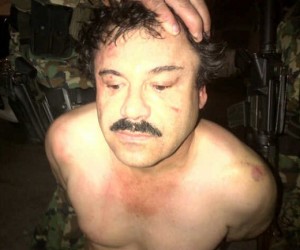 By David Amoruso (http://gangstersinc.ning.com Gangsters Inc.)
By David Amoruso (http://gangstersinc.ning.com Gangsters Inc.)
Sinaloa drug cartel leader Joaquin “El Chapo” Guzman has been captured by U.S. and Mexican law enforcement officials. He had been on the run since 2001 when he escaped from a Mexican prison. Guzman is considered to be the most powerful drug lord in Mexico and was even named on Forbes magazine’s 2009 list featuring the world’s most powerful people.
“A Mexican security source confirmed the capture, saying it took place in Mazatlan, a seaside resort in Guzman’s northwestern home state of Sinaloa,” Reuters added. Guzman was accompanied by a female when he was arrested and the bust was part of a joint operation with Mexican marines and Drug Enforcement Administration authorities overnight. The operation had been in the works for four or five weeks.
The arrest is a huge coup for law enforcement on both sides of the U.S. Mexican border. Guzman was on many Most Wanted lists and is now the 25th drug lord to be killed or captured of the 37 most-wanted organized crime leaders announced in 2010 by Mexican authorities.
It was an arrest nobody expected. For thirteen years Joaquin “El Chapo” Guzman was like a ghost. An all-powerful ghost though, who controlled large parts of Mexico and whose influence extended far into South and North America and Europe. The City of Chicago branded him the first “Public Enemy No. 1″ since Al Capone, due to Guzman’s grip on the city’s drug market and its gangs. U.S. authorities offered a $5 million reward for information that led to his capture.
Five million may seem like a lot of money to us regular folk, but for El Chapo it was pocket change. It hadn’t always been like that though. As the son of a peasant farmer he never had much and had to work real hard to accomplish even that. Unlike most farmers, the Guzman family didn’t tend to cattle or corn, they grew poppy instead. Guzman’s father was connected to one of the key players of the Sinaloa Cartel of that time. It wasn’t long before his son, El Chapo, which means Shorty, immersed himself in the violent world of smuggling and drugs.
By the late 1970s, Guzman was put in charge of drug transports from Mexico to the U.S. He took the responsibility extremely seriously. When one of his shipments did not make it across, for whatever reason, the middle-man had a big problem.
As Malcolm Beith writes in his book on Guzman titled The Last Narco, “If a delivery wasn’t made from the Sierra, or was delayed for some reason (even heavy rains, which would wash away entire roads, were no excuse), [Guzman] would execute the employee himself. He didn’t lose his temper, he just shot the man in the head.”
His modus operandi impressed Cartel higher ups and it wasn’t long before El Chapo rose through the ranks. His calculated ruthlessness proved to be too much for his rivals and he soon became the main leader of the Sinaloa Cartel.
As boss he made billions. His territory kept increasing and now encompasses most of Mexico. The Sinaloa Cartel provides dope for at least 78 U.S. cities and recruits American street gangs to do its bidding there. His wealth and power saw him listed in several Forbes lists, including the Most Powerful People on Earth list where he was listed with individuals like Barack Obama and Bill Gates.
But despite all his power and wealth, El Chapo still felt the heat of the law constantly on his back. In 1993 he was sent to prison on murder and drug charges. It was a deal Guzman was fine with. He practically owned the prison.
Hell, he owned half of Mexico! Doing time there was no problem. Doing time in the U.S., however, was something else entirely. 23 hour lockdown. Shackled in a tiny cell. No power to get things done. Now that would be hell on earth.
So when Mexican authorities signed a deal with the U.S. where they agreed to hand over drug traffickers to American authorities, Guzman immediately began thinking about getting out of there.
He did. In 2001 he quietly escaped the prison by going out with the dirty laundry. For the next thirteen years he would become a ghost. Haunting Mexico and its citizens. Haunting his rivals. And exerting control over a criminal empire not seen since Pablo Escobar.
Until last Friday.
Now, an American prison awaits him. His status as a street legend is set. It’s been carved in gold, stone, and blood. His status as an inmate doing time for some of the most heinous crimes ever committed by any gangster anywhere will now begin.
Somewhere in Mexico a new narco-corrido about El Chapo is being written. A song that, unlike many of the songs before, no longer has an open ending.


